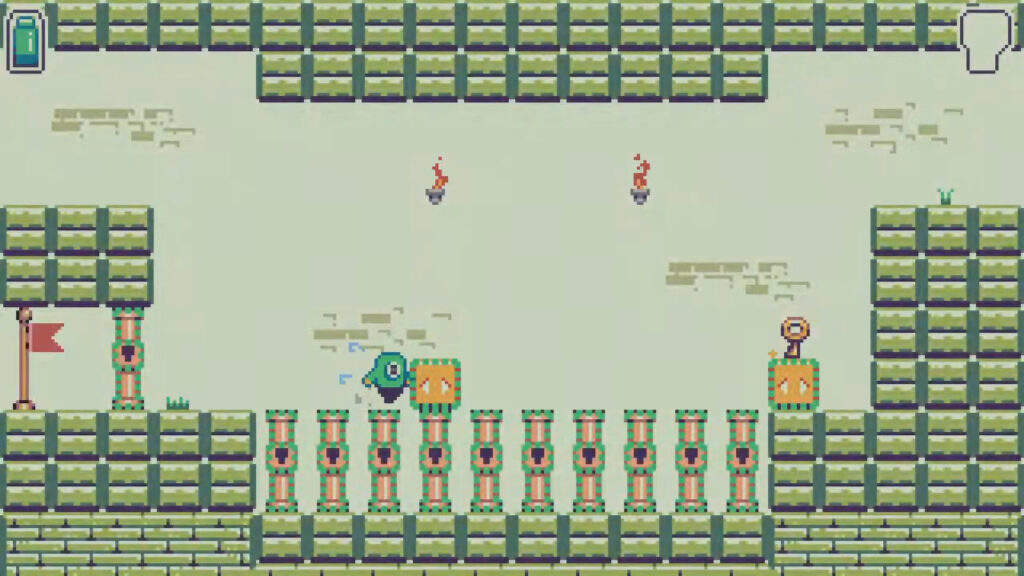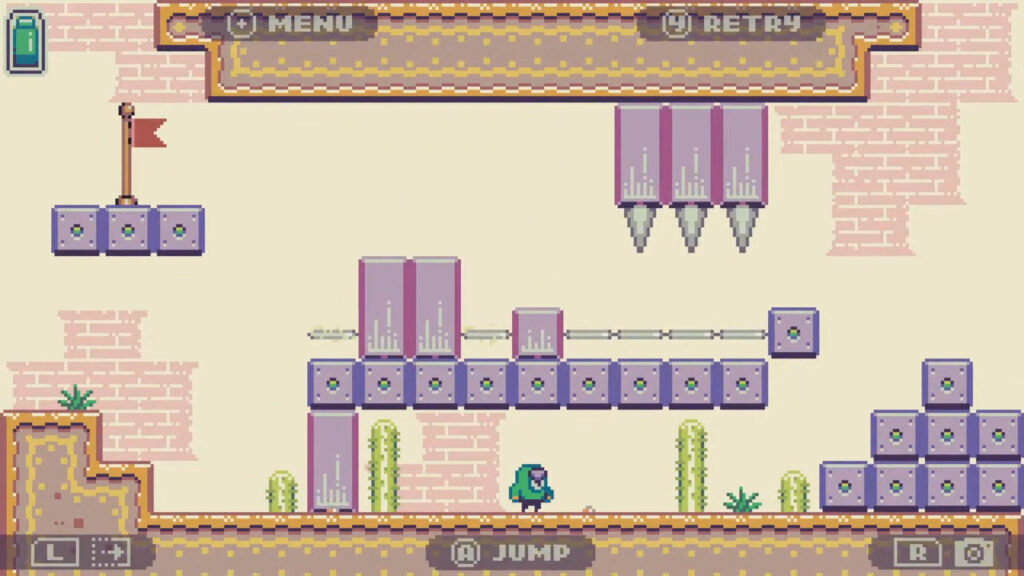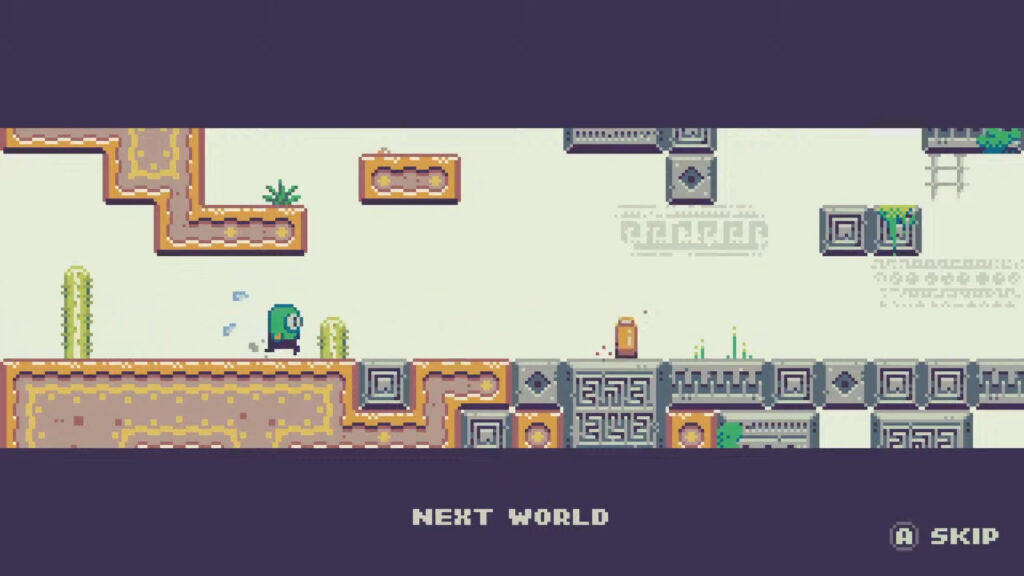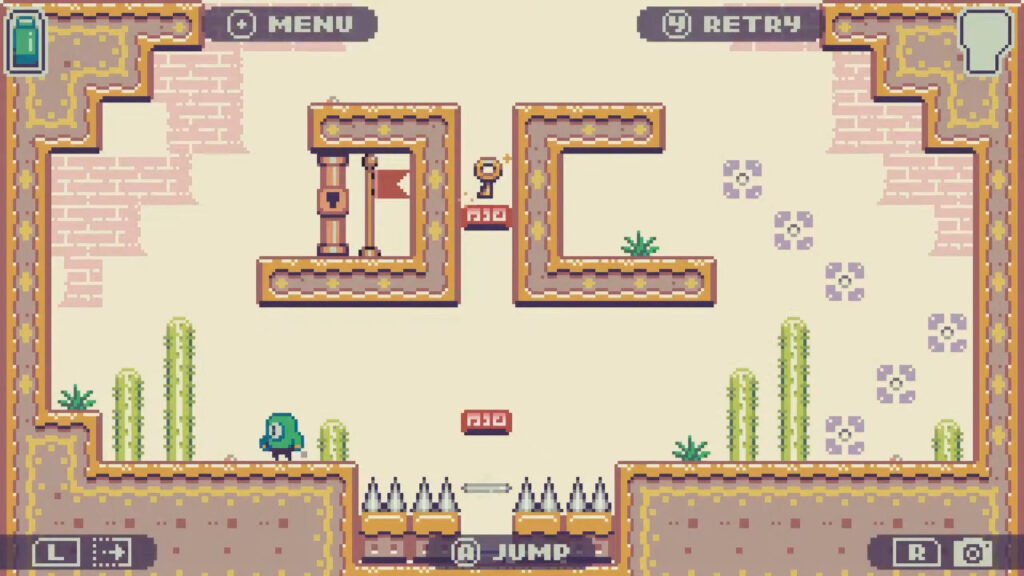
Developer: Chemical Pudding
Publisher: Phoenixx Inc.
Platform: PC, Switch
Tested on: Switch
FILMECHANISM – Review
A couple of weeks ago, FILMECHANISM was revealed during the Japanese Nintendo Indie World Showcase, with a surprise launch directly after the presentation. Although the announcement flew under the radar somewhat in territories outside of Japan, being buried under an avalanche of other indie game reveals, the game actually launched not just in Japan but worldwide. We were actually quite enamored by FILMECHANISM’s retro appearance, and were more than eager to dive into what the gameplay had to offer. Read on if you want to know if FILMECHANISM is worth snapping up.
Story
FILMECHANISM introduces us to Rec, a creature known as a camera humanoid, who also happens to be our protagonist. The opening scenes explain how Rec has arrived in a new star system and is eager to take lots of pictures; when tragedy strikes! After falling over, Rec loses his precious gold film, which is where he is supposed to store his pictures. Eager to reclaim the gold film, Rec sets out to find it. There isn’t anything more to the narrative beyond the opening scenes, which is a bit of a shame as we did feel like Rec’s adventure could’ve used some fleshing out. It’s clear though that Chemical Pudding’s focus was on delivering a fantastic gameplay experience instead, and as you’ll find out, they certainly did.
Graphics
Anyone that grew up in the ‘90s will immediately feel nostalgic when they see FILMECHANISM’s visuals, as the game looks like a dead ringer for a Game Boy Color title -except for the aspect ratio and screen size, of course. It’s a clever choice, as the simplistic visuals work surprisingly well for a modern title. Despite FILMECHANISM’s minimalistic approach, there is still plenty of visual variety present in the various environments too. The game is divided into separate, themed worlds and they all feel unique. Likewise, Rec’s character design is appealing and cute, despite its simplicity.
Sound
When a game fully embraces the Game Boy aesthetic visually, it doesn’t come as a surprise that the audio follows suit. The music isn’t a straight-up copy of something that you’d hear coming from the speakers of a Game Boy, but it does follow the same design principles. The cheerful base tune that makes up the majority of FILMECHANISM’s OST is cheerful and changes slightly for each world. We would’ve preferred a little more diversity when it came to the music, as even with the variations, it’s still the same tune over and over. Given that the rest of FILMECHANISM’s sound effects are little more than bleeps and bloops, and that there is no voice acting, you’re looking at a barebones soundscape that is only saved by how catchy the music is, even if it lacks variety.
Gameplay
Built around a simple but very solid idea, FILMECHANISM provides players with a surprisingly clever and addictive puzzle platformer. The game’s core mechanic is built around Rec’s ability to take pictures of his surroundings. The game is divided into a series of stages -over 200 of them, in fact- and these stages are filled to the brim with movable objects, ranging from blocks that can be pushed around to stage hazards that activate when you get close to them. Littered around these stages are colored canisters that Rec can pick up, and use to take a snapshot of the layout of a stage at any given time. After taking a picture, you can then manipulate parts of the stage by moving things around, clearing a path for Rec to reach specific locations. Rec can then restore the stage to what it looked like when the picture was taken, moving any blocks or hazards back to their original positions.
By doing this, new pathways are created, allowing Rec to reach areas he couldn’t reach before. The ultimate goal is of course to reach the red flag at the end of each stage, allowing you to progress ever closer to the gold canister and the game’s end. As Rec slowly but surely makes his way to this ultimate goal, stages become more elaborate and require multiple canisters -and thus snapshots- to complete them, as well as keys that open doors. Not only do puzzles become increasingly complex, but the platforming action ramps up as well, requiring precise jumps and a good feeling for timing to avoid certain obstacles. Despite its cutesy appearance, FILMECHANISM can be unforgiving at times, and even a small mistake can result in having to restart a stage -which, thankfully, can be done instantly, by simply pressing the Y-button.
That said, the game never feels unfair, despite its deceptive difficulty level. Hint coins that aid you with solving the puzzles are handed out generously, and although the game features different difficulty levels, -with the highest difficulty aptly named ‘Hell’- these seem to only really affect how precise your platforming needs to be rather than serving up some brutally mind-boggling puzzles. Changes are made to the puzzles on higher difficulties, but although they did become more elaborate, we felt like the increase in difficulty was more manageable on the puzzle front than on the platforming front. This increase in difficulty was especially noticeable since the game also times how long it takes you to complete a level, and the precise timing needed to clear some platforming elements was a major factor here.
Overall, FILMECHANISM’s gameplay is a showcase of how a brilliant game can be built around a simple idea. There are no unnecessary bells and whistles here and no forced gimmicks. Instead, the game employs a less-is-more approach, sticking with the picture-taking mechanic and pushing it to its logical limit. Every stage was crafted with this mechanic in mind, and the result is just fantastic. This is one of those games where you’ll say to yourself “one more stage” and then end up playing for two hours straight. It’s fun and addictive, thanks to its expert stage design and the controls, which feel tight and responsive.
It all adds up to a game that is definitely worth the €15/$20 asking price, even if the minimalist appearance would make you think it’s not. There is a surprisingly large amount of content here, as well as a huge incentive to replay levels as you attempt to shave off precious seconds of your individual stage time. The game embodies the “easy to learn but hard to master” principle to a tee, and is worth taking a look at just for that.
Conclusion
To say that we were pleasantly surprised with FILMECHANISM would be an understatement. We expect that a significant part of the audience will be drawn to the game purely due to its nostalgic visual appeal, but the main draw here is the excellent puzzle platforming gameplay. If you’re a fan of the genre, this is an essential addition to your library, and if you’re not into puzzle platformers, then FILMECHANISM might just be the title that changes that.
FILMECHANISM - Review,









No Comments